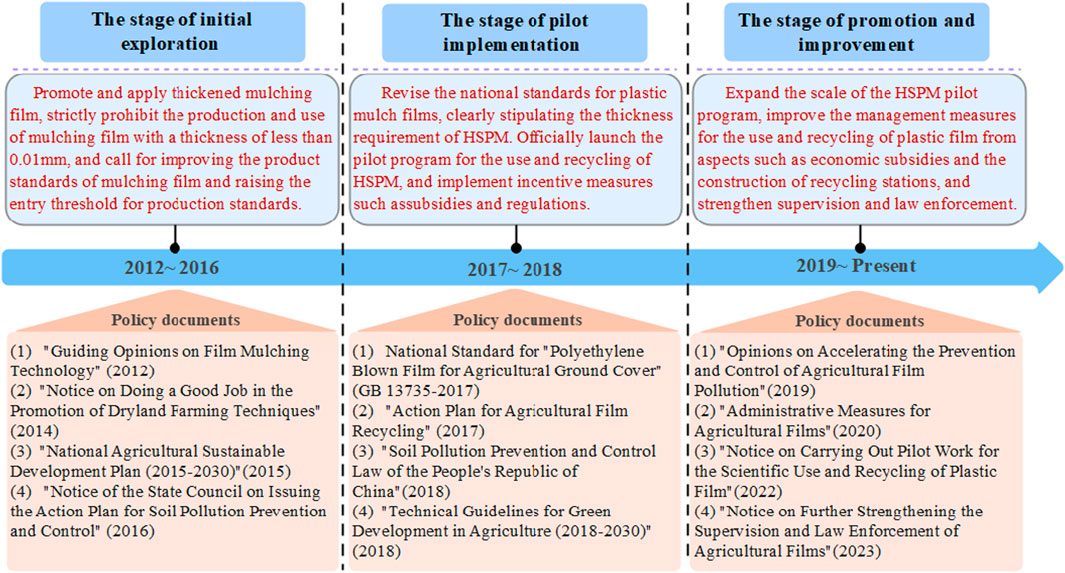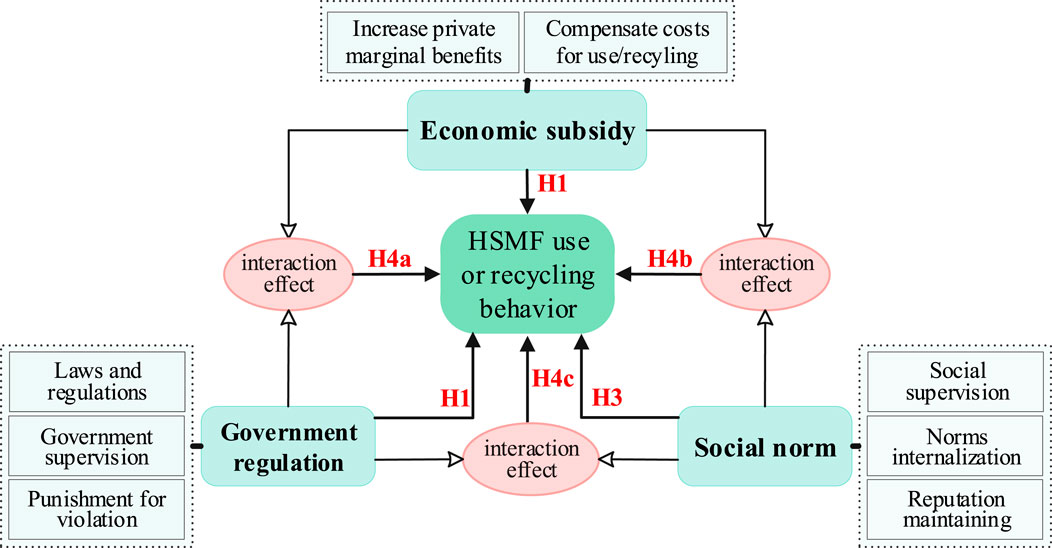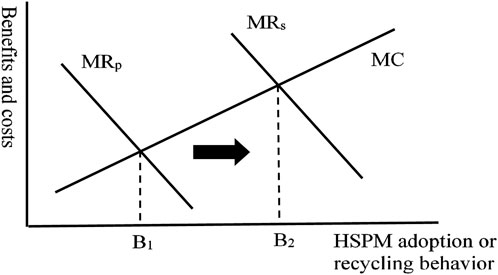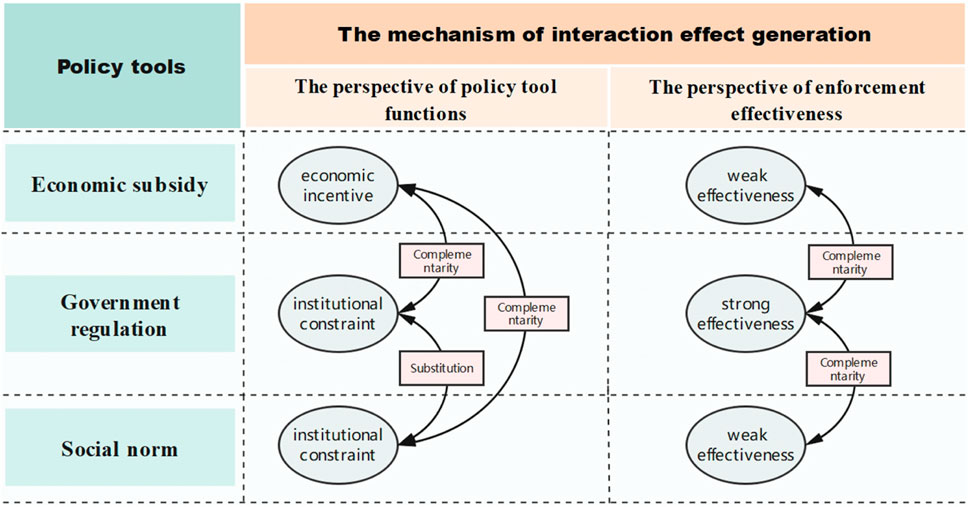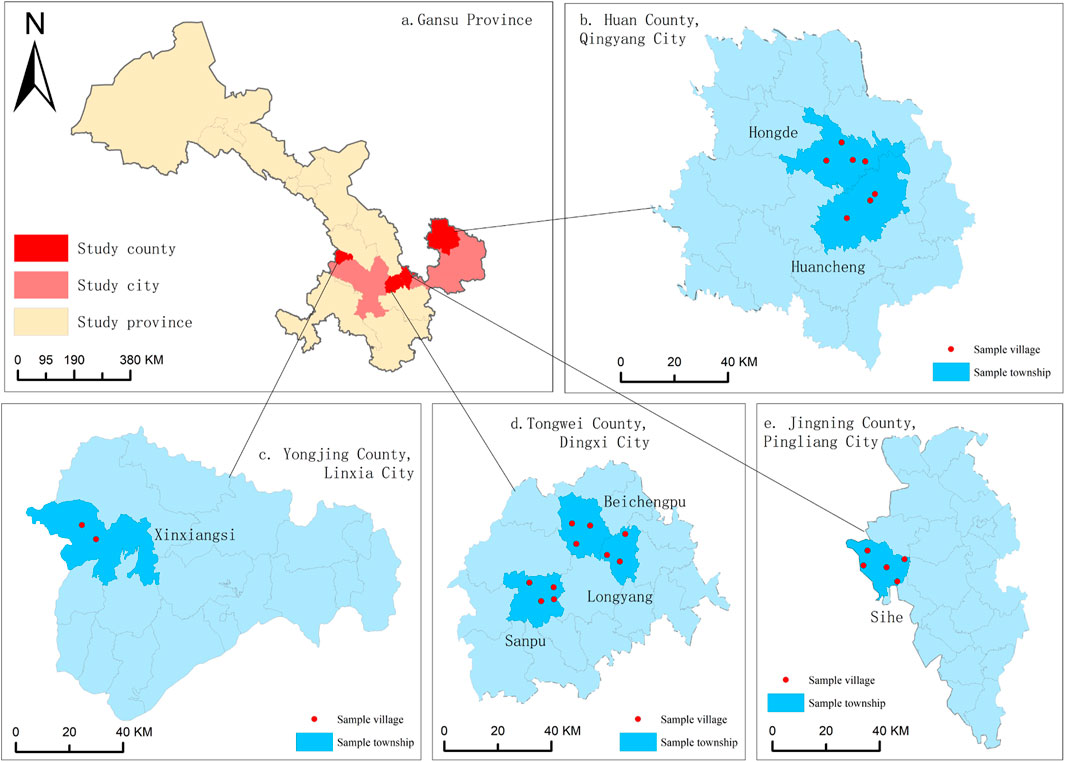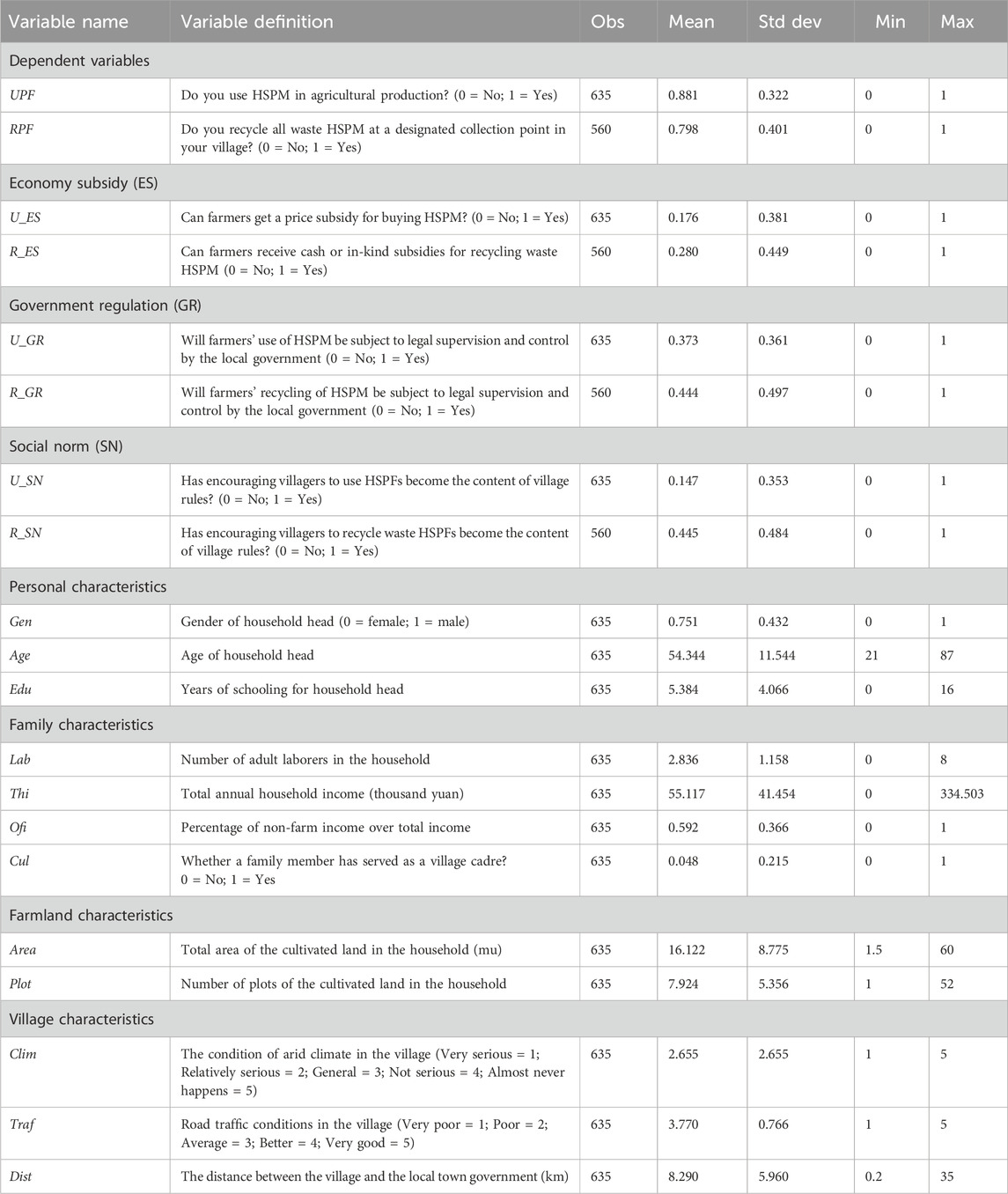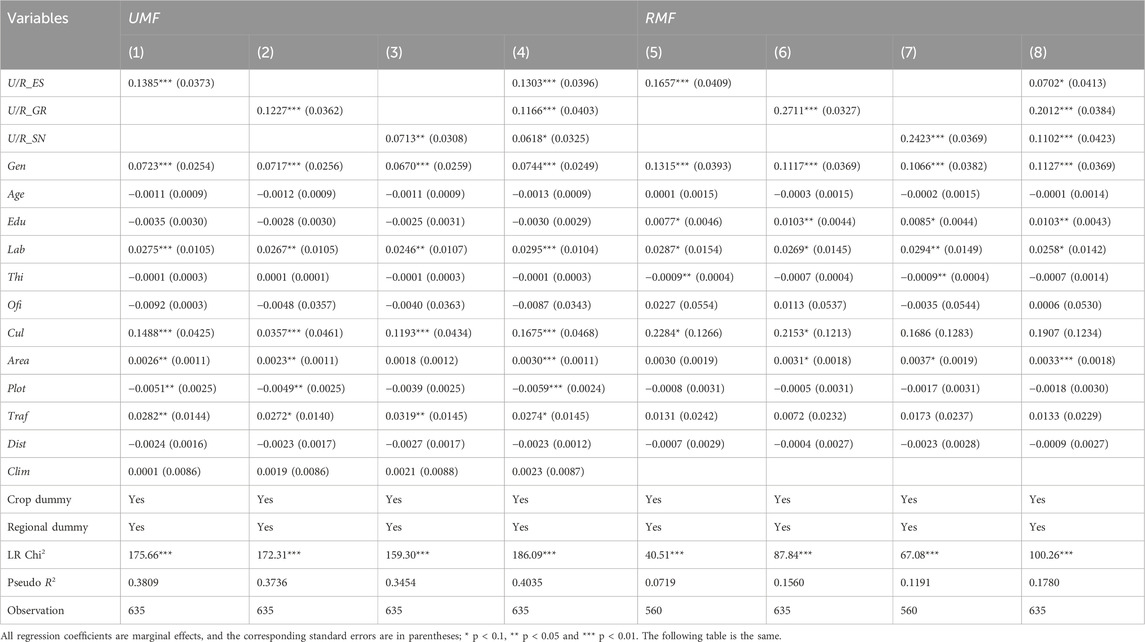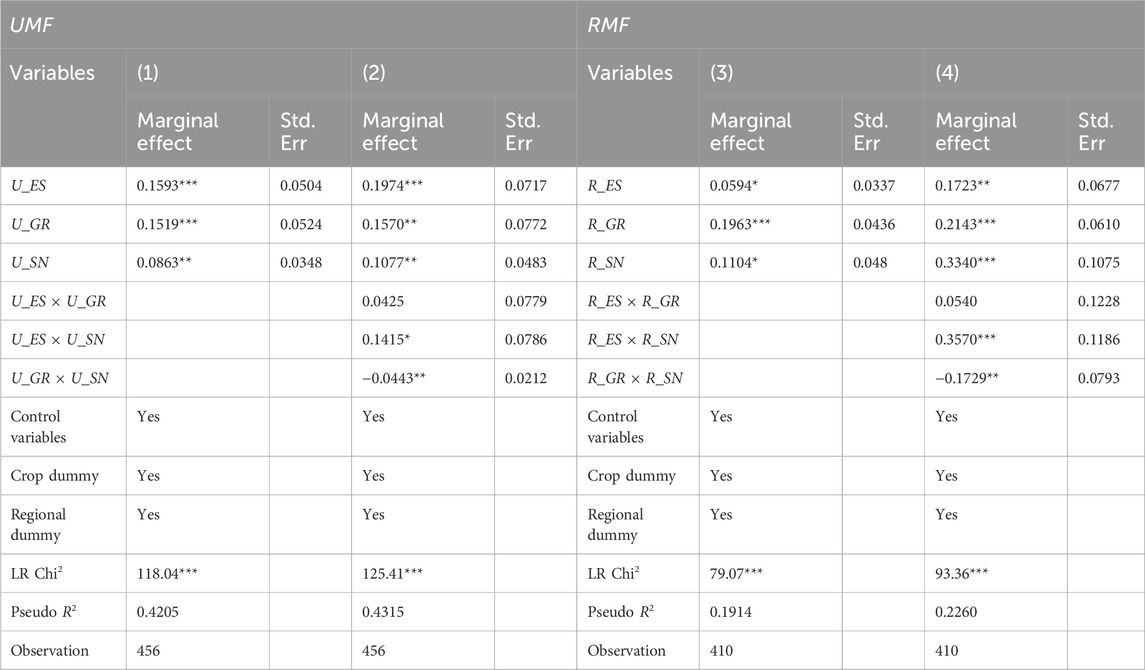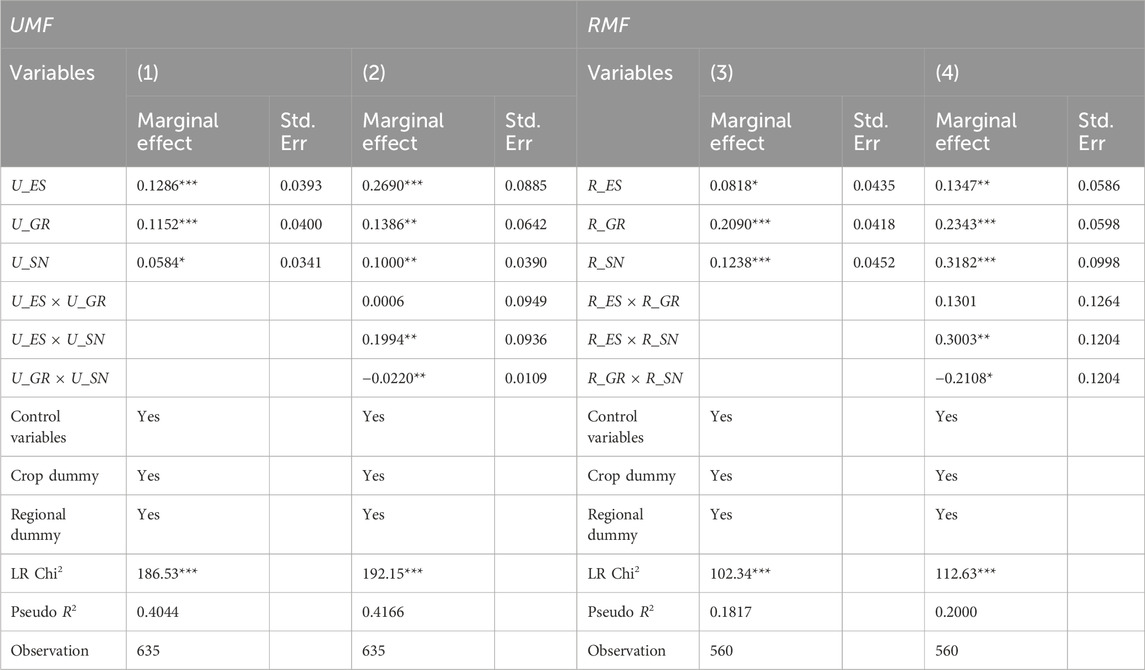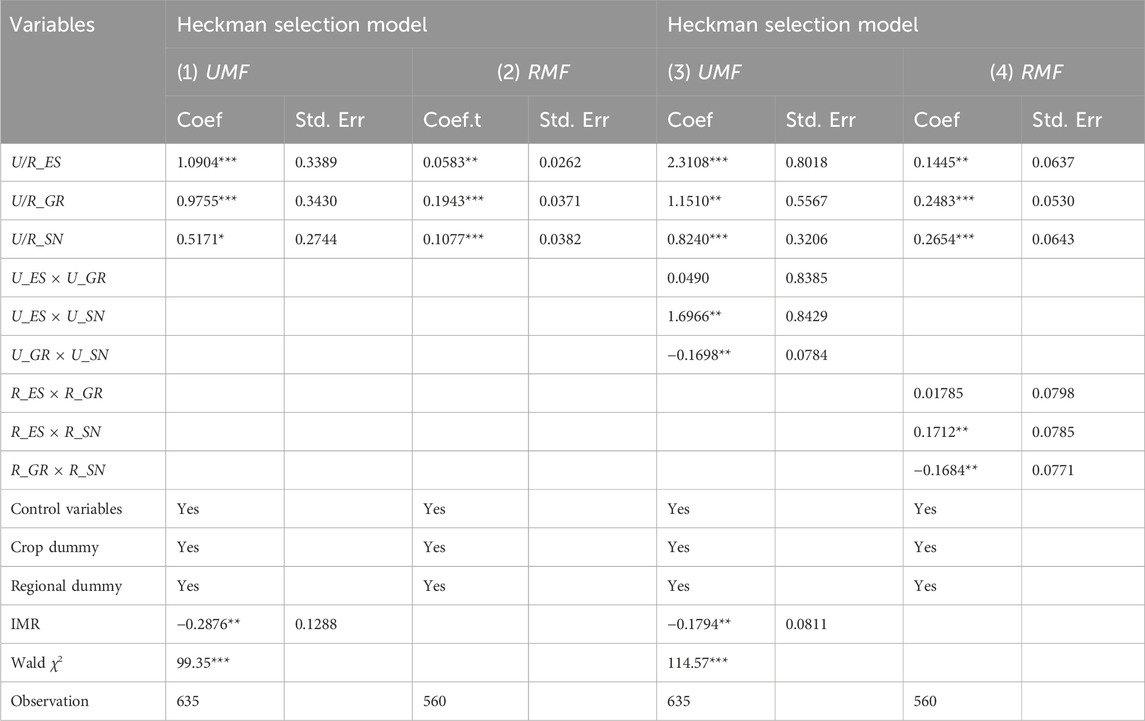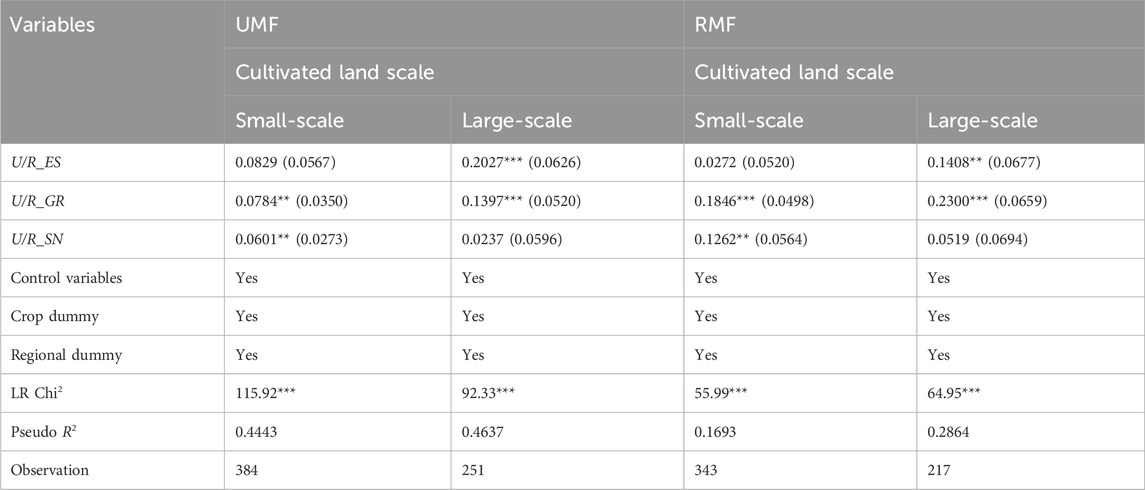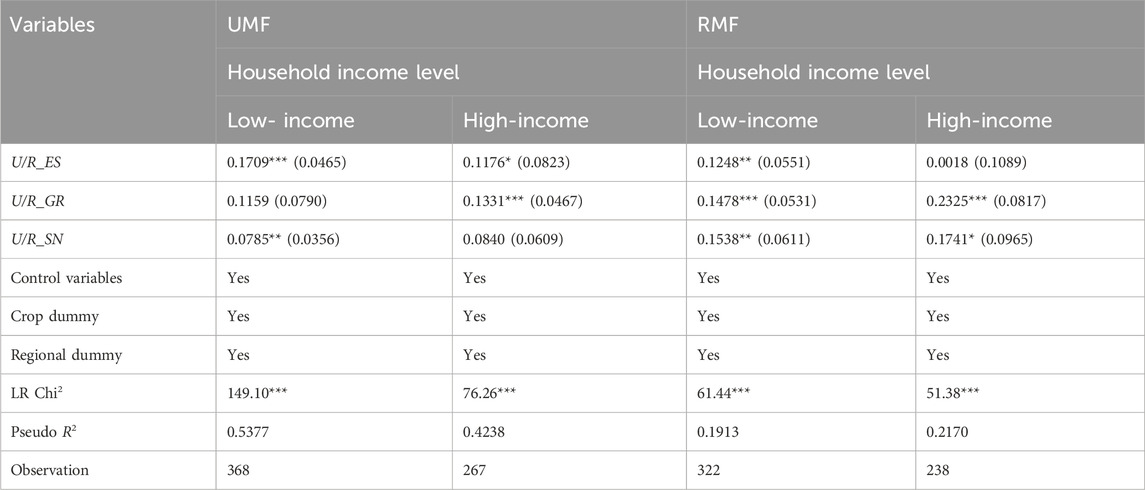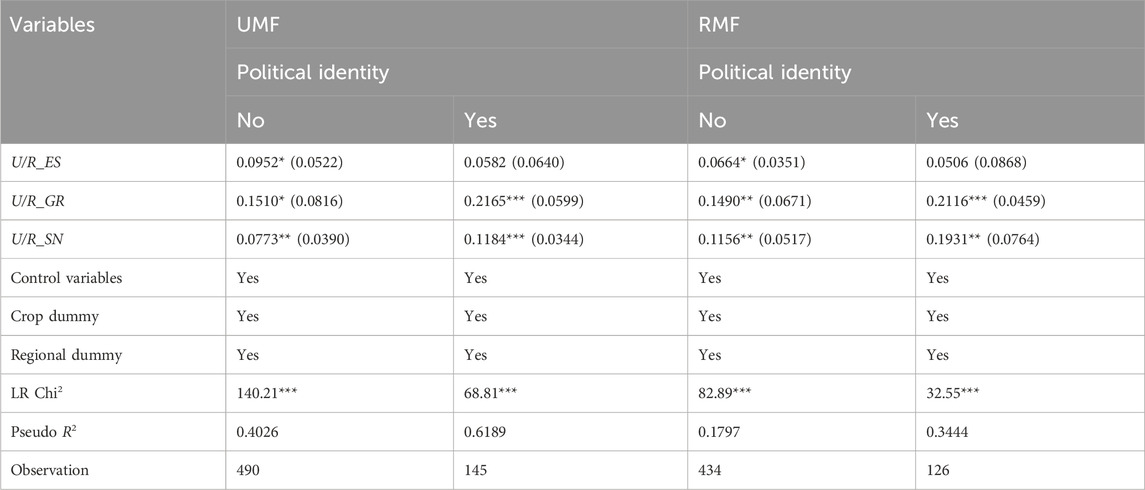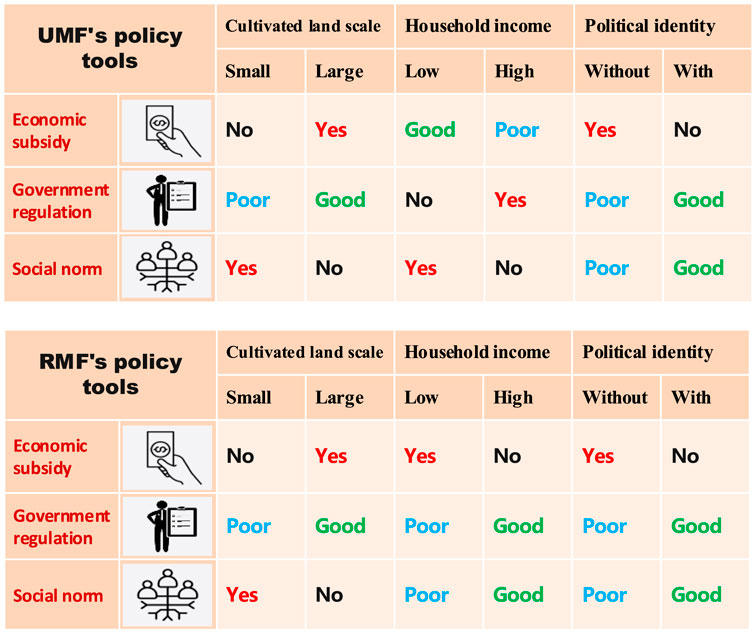- 1Economic College, Hunan Agricultural University, Changsha, China
- 2School of Public Administration and Policy, Renmin University of China, Beijing, China
The extensive application of ultrathin plastic mulch in China has resulted in soil degradation, declining crop yields, and the accumulation of microplastic pollution, thereby threatening both sustainable agricultural development and ecosystem health. Consequently, fostering the adoption and recycling of high-standard plastic mulch (HSPM) through economic subsidies and regulatory measures has become imperative. Based on survey data from 635 farmers in Gansu Province and econometric analysis, this study finds that subsidies, regulation, and social norms significantly increase HSPM adoption by 13.03%, 11.66%, and 6.18%, respectively, and recycling by 7.02%, 20.12%, and 11.02%. These measures also exhibit interactive effects: subsidies and norms are complementary, and norms may substitute for regulation. Further, incentive effects are heterogeneous. Subsidies are less effective for smallholders but more effective for low-income, nonpolitically affiliated farmers. Regulations and norms are more effective for high-income, politically affiliated farmers, with social norms showing particular promise in motivating smallholders.
1 Introduction
The utilization of plastic mulch films has significantly contributed to the growth of crops, yield and agricultural benefits and has been called the “white revolution” of agriculture (Liu et al., 2014; Wang et al., 2018). China started to introduce and embrace plastic film mulching technology from Japan in the late 1970s and has since become the country with the largest consumption of plastic film, the largest coverage area, and the most diverse range of crops covered (Daryanto et al., 2017; Zhang et al., 2019; Wang et al., 2020). From 1982 to 2021, the utilization of plastic mulch in China experienced a remarkable increase from 0.6 thousand tons to an astounding 1.32 million tons, while the covered area expanded exponentially from 117 thousand hectares to a staggering 17.282 million hectares, encompassing over 40 diverse cultivated crops. Thus, the extensive use of plastic mulch has significantly advanced the development of China’s agriculture and has made a crucial historical contribution to guaranteeing food security (Liu et al., 2014; Gao et al., 2019).
In China, ultrathin plastic mulch has been widely used for many years (Zhang et al., 2017), with approximately 96.7% of the mulch film thickness falling within the range of 0.004–0.008 mm (Shi et al., 2016). This thickness falls well below the established standards of developed countries or regions such as the United States (0.025–0.250 mm), Japan (>0.02 mm), and Europe (0.025–0.200 mm) (Jin et al., 2020). Owing to the lack of toughness and ductility, thin plastic mulch is prone to breakage and remains in the soil, making it difficult to recycle (Xie et al., 2023). Thus, the widespread use of this mulch is the root cause of residual film pollution in China (Zhang et al., 2017; Wang et al., 2018; Li et al., 2021a). Moreover, the current management approach, which is characterized by the extensive utilization and minimal recycling of plastic film, combined with the prolonged absence of an effective recycling system, has further intensified the issue of residual film pollution (Zhang et al., 2019). Currently, the residual amount of plastic film in Chinese farmlands accounts for approximately 1/3 to 1/4 of the total use, with an average residual amount of 60.0 kg/ha (Liang et al., 2019). In particular, in the windy and sandy areas of Northwest China, the residual amount of plastic film reaches 71.9–259.1 kg/ha (Gao et al., 2019). These plastic film residues not only affect crop growth and yield by damaging the soil structure (Zhao et al., 2021; Koskei et al., 2021) but also decompose into microplastics and release harmful substances such as phthalates that contaminate the soil (Song et al., 2021), posing a threat to China’s food safety and residents’ health (Wu et al., 2022; Zhang et al., 2020).
Compared with traditional thin mulch film, high-standard plastic mulch (HSPM) is thicker (exceeding 0.01 mm) and offers significant advantages in terms of increasing temperature and moisture retention, optimizing water and fertilizer utilization, ensuring soil nutrition, and increasing crop yields (Hu et al., 2019). Furthermore, HSPM has impressive tensile durability and weather resistance, so it is less prone to breakage or decomposition and facilitates recycling efforts that can substantially mitigate the pollution from residual film (Zhang et al., 2017; Li et al., 2021a). Consequently, the re-establishment of production standards alongside initiatives to promote HSPM usage and recycling among farmers has emerged as a critical strategy employed by the Chinese government to combat “white pollution” at its source (Zhang et al., 2019; Xie et al., 2023). The central government revised the national standard for Polyethylene Blow Plastic Agricultural Mulch Covering Film (GB 13735-2017) for the first time in 2017; this standard stipulates that the minimum thickness of mulch should not be less than 0.01 mm. In the same year, the Ministry of Agriculture and Rural Affairs (MARA) issued the “Action Plan for Agricultural Film Recycling”, which focused on launching HSPM pilot projects to promote adoption and recycling in Gansu, Xinjiang and Inner Mongolia. In 2022, the MARA and the Ministry of Finance jointly issued the “Notice on Launching Pilot Work on Scientific Use and Recycling of Agricultural Film” (hereinafter referred to as the “Notice”), explicitly stating that pilot initiatives would be further expanded with the aim of promoting HSPM application across more than 200 million mu (13.33 million hectares) by 2025 while increasing the national agricultural film recycling rate to over 85%. To ensure the effective implementation of this pilot policy and facilitate both the adoption and recycling of HSPM, supporting measures, including economic subsidies and governmental regulations, have been established by the central government (Wang et al., 2018). The specific policy evolution timeline is presented in Figure 1.
However, scholars have debated the efficacy of these supportive measures. On the one hand, some researchers contend that, bolstered by economic subsidies and government regulations, China’s efforts to control rural ‘white pollution’ have proven effective (Zhang et al., 2019), with the practical application of HSPM expanding and film recycling rates in pilot regions (Gansu, Xinjiang, and Inner Mongolia) consistently exceeding 80% (Zhang and Quan, 2022). On the other hand, many scholars argue that the anticipated incentive effects of these supporting measures are limited or even ineffective due to operational challenges such as unreasonable subsidy standards, inadequate supervision and enforcement (Wang et al., 2018; Liu et al., 2023), and ongoing illegal usage and disposal practices by farmers (Zhang, 2020; Li, 2022). Thus, the state of agricultural film pollution in China remains dire (Pang and Jin, 2023). Furthermore, some other academics argue that while supporting measures may not be entirely ineffective, their incentive effects can vary significantly. Compared with village leaders and large-scale farmers, ordinary farmers and smallholders often experience diminished incentives due to information asymmetries coupled with high monitoring and enforcement costs (Wang et al., 2018).
The prevention and control of plastic mulch pollution constitute a typical rural ecological-environmental governance issue. According to global research on ecological environment governance, community autonomy is a useful tool for ensuring the protection of the rural public environment beyond market incentives and government control (Ostrom, 2014). Market and government governance measures need to be integrated with local informal institutions to ensure the effectiveness of ecological and environmental governance (Feng et al., 2024). Social norms embody informal systems in community autonomy. Specifically, they represent a set of ethical guidelines established and enforced by community members, influential figures, and inhabitants within local villages (Cialdini and Goldstein, 2004; Li et al., 2022). These principles are derived from shared historical and cultural customs, indigenous knowledge, and mutual trust among farmers (Li et al., 2022). While social norms may lack the same level of coercion that is found in government regulations, they have a lasting and impactful influence on individuals’ conduct (Huber et al., 2018). For example, once HSPM adoption and recycling became a code of conduct for farmers in a village, village members followed suit (Tan et al., 2019). Some studies have confirmed the positive role of social norms in promoting the recycling of residual film (Li C. L. et al., 2021; Li et al., 2021c; Wang and Yang, 2021), but its interaction with economic subsidies and government regulations has been overlooked.
In summary, previous studies have certain policy reference value for how to encourage HSPM adoption and recycling, but the following deficiencies remain. First, the controversial views in the existing research on the effectiveness of economic subsidies and government regulations are questionable because these views are based on the statistical analysis of limited macro- or microdata and lack rigorous theoretical analysis and econometric tests. Second, while the positive impact of social norms on plastic mulch recycling behavior has been validated, its potential to promote farmers’ adoption of HSPM remains uncertain. Additionally, economic subsidies, government regulations and social norms are theoretically and essentially based on the three typical means of market, government and community autonomy to encourage farmers to adopt and recycle HSPM, but the important interactions among the three may be overlooked. Finally, although a few scholars have observed the possible group heterogeneity of the incentive effect of these measures, empirical evidence is still lacking.
Therefore, using econometric models, this study investigates the impact of economic subsidies, government regulations, and social norms on HSPM adoption and recycling behavior by deconstructing the theoretical influence mechanism and analyzing survey data from rural households in Gansu Province. Furthermore, it also analyzes the interaction effects and group heterogeneity of these influences. This study has important theoretical and practical value. In theory, placing market-based economic subsidies, government-based supervision and control, and social norms on the basis of community autonomy in the same framework will provide a better understanding of how these three factors affect farmers’ plastic mulch pollution control behavior. In practice, an empirical test of the effects of the three measures can provide valuable empirical evidence and a theoretical reference for optimizing China’s HSPM use and recycling policy.
2 Theoretical analysis and research hypotheses
Economic subsidies and government regulations are the main supporting measures for the pilot HSPM utilization and recycling in China. The economic subsidies provided to farmers can encourage HSPM adoption and recycling, as these incentives outweigh any extra expenses that villagers may face when utilizing or recycling HSPM, thereby increasing their private marginal income. Government regulation is based on authoritative laws, regulations, and formal systems to constrain farmers’ conduct due to its potential for escalating private marginal costs and internalizing the social costs arising from villagers’ transgressions. Furthermore, social norms, serving as an informal system of community autonomy, bind villagers’ behavior and promote altruistic actions such as the use of HSPM and recycling. Owing to the overlap or differences in functions and enforcement effectiveness among the three measures (Li et al., 2019; Du and Zhou, 2023), they engage in a bidirectional interplay (complementary or substitute), which jointly affects farmers’ HSPM adoption and recycling. The specific mechanism of impact is illustrated in Figure 2.
2.1 Effects of economic subsidies on HSPM adoption and recycling
According to classical microeconomic principles, rational people’ behavior follows the principle that marginal benefits are equal to marginal costs. In reality, however, marginal benefits and marginal costs are often not entirely private (Coase, 2013). Compared with traditional thin plastic mulch, HSPM is durable, water resistant and easy to recycle. Its adoption not only promotes increased production and income but also helps reduce pollution and improve the rural ecological environment (Zhang et al., 2017). However, the benefits of environmental improvement extend beyond the farmers who adopt and recycle. As depicted in Figure 3, the individual marginal benefit (MRP) experienced by farmers when they adopt and recycle HSPM is significantly less than the societal marginal benefit (MRS) they gain from the improvement of ecological conditions. Considering the maximization of social welfare, the ideal HSPM adoption and recycling behavior should be B2 (MRS equals social marginal cost). However, in reality, farmers only adopt and recycle HSPM at the B1 level (much lower than B2) to maximize their personal benefits. This leads to the classic free-rider problem, in which farmers are unwilling to actively adopt and recycle HSPM (Xie et al., 2023). However, this problem can be effectively solved through the use of market tools, that is, by providing economic subsidies to farmers and internalizing the social marginal benefits brought by their behaviors (De Lucia and Pazienza, 2019). As shown in Figure 3, by providing subsidies, the MRP curve can be shifted to the right until it coincides with the MRS curve, resulting in an increase in farmers’ adoption and recycling behavior of HSPM from B1 to B2. This subsidy, in the adoption stage, can at least compensate farmers for the extra cost of replacing plastic mulch. In the recycling phase, this subsidy can compensate for the various expenses involved in the recycling procedure and the decrease in leisure time utility (Li et al., 2023). Thus, the following hypothesis is proposed in this study:
H1. Economic subsidies can effectively encourage farmers to adopt and recycle HSPM.
2.2 Effects of government regulations on HSPM adoption and recycling
In addition to the market strategy of providing economic subsidies, nonmarket means of government regulation can also be employed to address externalities in HSPM adoption and recycling. Government regulations have the advantages of clear targets, mandatory execution and direct effects. The typical approach employed for these regulations involves establishing behavioral standards for the adoption and recycling of plastic mulch by promulgating laws and regulations and conducting behavioral supervision and control accordingly (Gunningham, 2011). First, behavioral standards for the adoption and recycling of plastic mulch should be established. As shown in Figure 3, the government can directly require farmers to adopt and recycle HSPM at the B2 level according to corresponding laws and regulations. At this time, the social marginal benefit of HSPM adoption and recycling is equal to the marginal cost, and social welfare is optimized. However, without the supervision and control of other supporting measures, this standard of conduct is often not binding (Dong et al., 2020). Second, the government can effectively limit farmers’ speculation in mulch adoption and recycling by authorizing certain local administrative organs to conduct regular supervision and inspection (Yang et al., 2024). Third, violators should be criticized and punished according to laws and regulations to increase the economic and reputational costs of their violations (Wang et al., 2020), thereby incentivizing them to adopt and recycle HSPM in compliance. For example, in the “Gansu Province Waste Agricultural Film Recycling Regulations” implemented in 2021, “the production, sale and use of agricultural plastic mulch with a thickness of less than 0.01 mm or other indicators that do not meet mandatory national standards” are prohibited, and “individual users of agricultural film who dispose of, bury or burn waste agricultural film at will on farmland or other agricultural land may be imposed a fine of not less than 200 yuan but not more than 2,000 yuan”. Thus, the following hypothesis is proposed in this study:
H2. Government regulations can effectively encourage farmers to adopt and recycle HSPM.
2.3 Effects of social norms on HSPM adoption and recycling
In addition to the market and the government, social norms in rural community autonomy can also effectively address externalities by setting a code of conduct in village regulations that requires farmers to adopt and recycle HSPM at the B2 level (Figure 3). In rural China, interpersonal relationships play a crucial role in public affairs because of the existence of blood, kindred and geographical ties. HSPM adoption and recycling are heavily influenced by social norms, which stem from the apprehension of potential repercussions within intricate interpersonal dynamics (Li et al., 2022). First, the establishment of societal norms is accompanied by communal oversight (Kerridge, 1978). This social supervision ensures that social norms can restrain villagers’ behavior (Sun et al., 2020). Once HSPM adoption and recycling are accepted as social norms, their influence on villagers’ behavior becomes stronger, enabling them to choose behaviors that are conducive to collective welfare (Li et al., 2022). Second, social norms can be passed on and internalized as individual norms for farmers (Luo et al., 2021). In the rural acquaintance community, farmers’ behavior is easily influenced by the assimilation of others in the village, resulting in herd mentality and herd effects (Guo et al., 2019). Under long-term influence, villagers unconsciously develop a sense of value identity for social norms through the transmission of various values among each other, and these are then internalized into personal norms (Guo et al., 2020). Third, people who violate social norms suffer the loss of trust, identity and reputation. Moreover, violators may be ostracized by other farmers and lose tangible benefits in collective action (Pejovich, 1999) because they seem to lack social morality and undermine the principle of collective action (Li et al., 2022). Thus, the following hypothesis is proposed in this study:
H3. Social norms can effectively encourage farmers to adopt and recycle HSPM.
2.4 Interactive effects of economic subsidies, government regulations and social norms
Market-based and government-based governance measures need to be combined with local informal institutions to ensure effective ecological and environmental governance (Feng et al., 2024). In practice, economic subsidies and government regulations are used to incentivize farmers to adopt and recycle HSPM, but their interaction mechanisms with each other and with social norms are often overlooked. Owing to the overlap or difference in functions and enforcement effectiveness, the interaction between these three types of measures may be complementary or substitutional. In terms of function, subsidies are economic incentives (Xie et al., 2023). Subsidies have an income effect on farmers and positively encourage them to adopt and recycle plastic mulch with positive externalities. In contrast, government regulations and social norms are formal and informal institutionally binding means, respectively, that inhibit farmers’ violation behaviors through supervision and punishment (Li et al., 2019). Hence, when encouraging farmers to adopt and recycle HSPM, economic incentives and governmental policies or social norms may be synergistically connected, while governmental regulations and social norms might serve as alternatives to each other.
In terms of enforcement effectiveness, government regulations have the highest enforcement power, followed by economic subsidies and social norms. Owing to the high price of HSPM and the low recycling value of residual film, the current implementation of economic subsidies is insufficient (Hou et al., 2019; Liu et al., 2020), which limits the effectiveness of the measure (Li et al., 2023). Government regulation is a formal system that is enforced according to laws and regulations. Although it has the advantages of clarity and compulsion, excessive enforcement may lead to resistance among farmers and restrict the incentive effect. In contrast, social norms, as informal constraints, are inherent in rural “acquaintance society” and local systems of farmers’ long-term production and life practices. Social norms not only have low implementation costs but also are more friendly than external regulatory constraints are (Li et al., 2019). However, residents who do not adhere to norms can be morally persuaded but cannot be forced to implement them (Reno et al., 1993), so the efficacy of social norms may need to be supplemented by government regulations. Therefore, government regulations, economic subsidies, and social norms differ in terms of implementation effectiveness, but each has advantages and disadvantages. They can compensate for each other and jointly promote farmers’ HSPM adoption and recycling behavior.
In summary, to present the interaction effects among the above three types of policy tools more clearly, we have drawn a mechanism framework diagram of their interaction (Figure 4), and put forward the following hypotheses:
H4a. Economic subsidies and government regulations may be complementary in incentivizing farmers to adopt and recycle HSPM.
H4b. Economic subsidies and social norm regulations may be complementary in incentivizing farmers to adopt and recycle HSPM.
H4c. Government regulations and social norms may be either substitutive or complementary in incentivizing farmers to adopt and recycle HSPM.
2.5 Heterogeneity of the effects of economic subsidies, government regulations and social norms
In different farmer groups, these three measures may have different effects on farmers’ HSPM adoption and recycling behavior. The economic subsidies received by farmers are positively correlated with the amount of HSPM adopted and recycled. Thus, large-scale farmers receive more subsidy income than do small-scale farmers and thus have a stronger intention to adopt and recycle HSPM. As the subsidies provided to large-scale farmers are substantial enough to incentivize their adoption and recycling behaviors (Wang et al., 2018), their effectiveness in being bound by social norms is reduced. In contrast, small-scale farmers receive few economic subsidies, which have no magnitude effect, so it is difficult for these subsidies to exert incentive effects on them (Li et al., 2022). At this time, social norms are more conducive to compensating for the limited effectiveness of economic subsidies to better encourage small-scale farmers to adopt and recycle HSPM. Additionally, owing to the different implementation costs and social impacts under control, local governments are more likely to pay attention to the plastic mulch adoption and recycling behavior of large-scale farmers than to that of small-scale farmers. Therefore, large-scale farmers are better constrained by government regulations. Thus, the following hypothesis is proposed in this study:
H5a. Incentives for HSPM adoption and recycling, economic subsidies, and government regulations are more effective for scale farmers, while social norms are more effective for small farmers.
According to the theory of cardinal utility, the marginal utility derived from economic subsidies is significantly greater for low-income famers than for high-income famers. Therefore, the effect of economic subsidies employed to encourage high-income famers to adopt and recycle HSPM is lower than that of low-income famers. Moreover, in rural areas, the higher the income is, the greater the farmer’s social status. Compared with low-income farmers, high-income farmers pay more attention to maintaining their reputation (Li et al., 2022). They are more inclined to adhere to government regulations and social norms to avoid punishment from the local government and criticism from the village collective for engaging in the illegal adoption and recycling of plastic mulch. Additionally, their illegal behavior will not only face the cost of social reputation loss but also lead to the government imposing fines, which will result in economic losses (Xie et al., 2023). Therefore, as high-income farmers are faced with the risk of “losing both fame and profit”, they are more influenced by the promoting effect of government regulations than by that of social norms. The following hypotheses are proposed in this study:
H5b. Incentives for HSPM adoption and recycling and economic subsidies are more effective for low-income farmers, while government regulations and social norms are more effective for high-income farmers.
In China, Party members and village cadres are important political identities for rural residents. In the social evaluation and self-evaluation of farmers with a political identity, the norm of behavior is to “take the lead and model” (Dong and Guo, 2017) to strengthen the authority of village committees in decision-making. If farmers violate the formal or informal norms corresponding to their status, they will feel guilty and “lose face” in their hearts (Lu et al., 2016) and even be punished by the Party. Compared with ordinary farmers, farmers with a political identity exhibit greater adherence to government regulations and societal norms pertaining to the adoption and recycling of plastic mulch, irrespective of their subsidy status. Additionally, China’s rural governance has been in an “elite governance” mode for many years (Li and Yao, 2020), and farmers with political identity are often high-income groups in addition to their high social status in the village (Li et al., 2022). Therefore, the impact of economic subsidies on encouraging farmers with a political identity to adopt and recycle HSPM is relatively low. The following hypothesis is proposed in this study:
H5c. Incentives for HSPM adoption and recycling and economic subsidies are more effective for ordinary farmers, while government regulations and social norms are more effective for farmers with a political identity.
3 Data and methodology
3.1 Data collection
The data used in this study were derived from a rural household survey conducted by our research team in Gansu Province from October to November 2019. Gansu Province is situated in Western China and lies within the upper region of the Yellow River, spanning from 32°11′ to 42°57′ north latitude and 92°13′ to 108°46′ east longitude. The average annual temperature of Gansu Province is 8.7 °C, the sunshine duration is 2341.9 h, the average precipitation is only 514.4 mm, but the evaporation is as high as 1890.8 mm. It is a typical ecologically fragile and dry farming area in China (Gansu Provincial Bureau of Statistics, 2019). The province introduced plastic mulch technology earlier, and it is one of the regions with the most severe plastic mulch usage, coverage area and residual pollution in China (Zhao et al., 2024). According to statistics, the total annual use of plastic mulch in Gansu Province is 121,700 tons, the plastic mulch cover area is 1,391,400 hm2 (Cheng et al., 2018), and the residual amount of plastic mulch reaches 90–135 kg/hm2, which exceeds the average rate across the country. Additionally, Gansu was designated by the Chinese government in 2017 as one of the first provinces to pilot HSPM adoption and recycling. It was also the first province to formulate and implement local policies and regulations, such as the Regulations on the Recycling of Waste Agricultural Film and the Implementation Plan for the Scientific Adoption and Recycling of Plastic Mulch (Xie et al., 2023).
In this study, the stratified random sampling method was used to obtain survey samples. First, four cities in Gansu Province, namely, Qingyang, Dingxi, Pingliang, and Linxia, were randomly selected as research areas on the basis of their level of economic development and use of plastic mulch. In each city, one demonstration county of HSPM use and recycling, which included Huan, Tongwei, Jingning and Yongjing, was selected as the sample county. Second, 1–3 pilot towns in each pilot county, along with 3–5 administrative towns within villages in each town, were selected. Third, 20–30 rural households were randomly selected from each sample village for household surveys. The sample selection involved nearly 650 farmers from 24 villages across 7 towns and 4 counties within Gansu Province. A total of 640 farmers were surveyed, and after excluding incomplete questionnaires, 635 valid responses were retained, yielding an effective response rate of 96.87%. All retained questionnaires were complete, with no missing values. The distribution of specific sample points is shown in Figure 5.
3.2 Econometric model specification
This study empirically tests the research hypothesis by constructing an econometric model. Two dependent variables are included in this study: “whether farmers adopt HSPM (UPM)” and “whether farmers recycle all waste HSPM to the fixed recycling point (RPM)”. Since both the UPM and the RPM are binary variables, the Probit model is employed to estimate Equations 1, 2.
In the equations,
3.3 Variables and descriptive statistics
In this study, “whether farmers can obtain economic subsidies for using (recycling) HSPM,” “whether farmers’ adoption (recycling) of HSPM will be supervised and controlled by the local government in accordance with the law” and “whether encouraging farmers to adopt (recycle) HSPM has become part of the village rules and regulations” were used to measure
4 Results
4.1 Descriptive statistics of the core variables
The statistical results show that 88.1% of the surveyed farmers adopt HSPM for agricultural production, indicating that the popularization rate of HSPM is high, but there is still room for improvement. Furthermore, among these adopters, 79.8% of the farmers said that they had sent all waste HSPM to a fixed recycling point. The recycling rate of plastic mulch was relatively high and basically consistent with the official statistics of the province that year (80%). However, this recycling rate still has a gap from the national target of 85% by 2025. Additionally, 17.6%, 37.3%, and 14.7% of the farmers believe that using HSPM can lead them to obtain financial subsidies, accept government control and become the rules of their village, respectively. Similarly, in terms of promoting HSPM recycling, the percentages were 28.0%, 44.4%, and 44.5%, respectively. On the whole, the practices of the three measures are relatively low, but the implementation of plastic mulch recycling is obviously better than the adoption of plastic mulch.
4.2 Benchmark estimation results
In Table 2, the estimated results of the HSPM adoption behavior equation are shown in the first four columns, whereas the estimated results of the recycling behavior equation are displayed in the last four columns. In Models (1) ∼ (8), the chi-square test shows a significant fit at the 1% level, suggesting that all the models are satisfactory. Additionally, the core independent variables in all the models are significantly positive, and the goodness of fit of the full model (Columns (4) and (8)) is greater than that of the non-full model, indicating that the benchmark results are robust. For this reason, the results of the full model are used for analysis.
Model (4) indicates that the probability of adopting HSPM by farmers who can obtain economic subsidies is 13.03% higher than that of farmers who cannot, and it is significant at the 1% level. The probability of farmers with government regulations using HSPM increased by 11.66% compared with those without regulations and passed the significance test of 1%. Additionally, the probability of farmers being encouraged to adopt HSPM by village rules is 6.18% higher than that of farmers not being encouraged by village rules and is meaningful at the significance level of 10%. Similarly, as shown in Column (8), the provision of economic subsidies, the implementation of government regulations and the formation of social norms increase the probability of farmers recycling waste HSPM by 7.02%, 20.12% and 11.02%, respectively, and pass the significance test of 10%, 1% and 1%, respectively. In conclusion, economic subsidies, government regulations and social norms play positive roles in promoting HSPM adoption and recycling, and research hypotheses H1, H2, and H3 have been proven to be generally acceptable.
For the control variables, Gen, Lab, Cad, Area and Traf are all significantly positive, and Plot is significantly negative in the mulch adoption behavior equation. This indicates that farmers with male heads of household, village cadres, a large labor force, a large cultivated land area, a low degree of land fragmentation, and good village traffic conditions are more likely to adopt HSPM. In the behavior equation of mulch recycling, Gen, Edu, Lab and Area are significantly positive. This means that farmers with a male head of household, a high education level, a large labor force and a large cultivated land area are more likely to recycle all waste HSPM.
4.3 Interaction effect estimation results
Economic subsidies, government regulations and social norms can still effectively encourage HSPM adoption and recycling after interaction items are included. Table 3 shows that, in the adoption behavior equation (Columns (1) ∼ (4)), the coefficient of “U_ES × U_SN” is significantly positive, suggesting that economic subsidies and social regulations are complementary, which also means that the positive effects of these two measures on farmers’ HSPM adoption behavior can amplify each other. The coefficient of “U_GR × U_SN” is significantly negative, indicating that there is an alternate relationship between government regulations and social norms in incentivizing HSPM adoption behavior. The coefficient of “U_ES × U_GR” is positive, but it does not pass the z test, which means that the interaction between government regulations and economic subsidies is not observed.
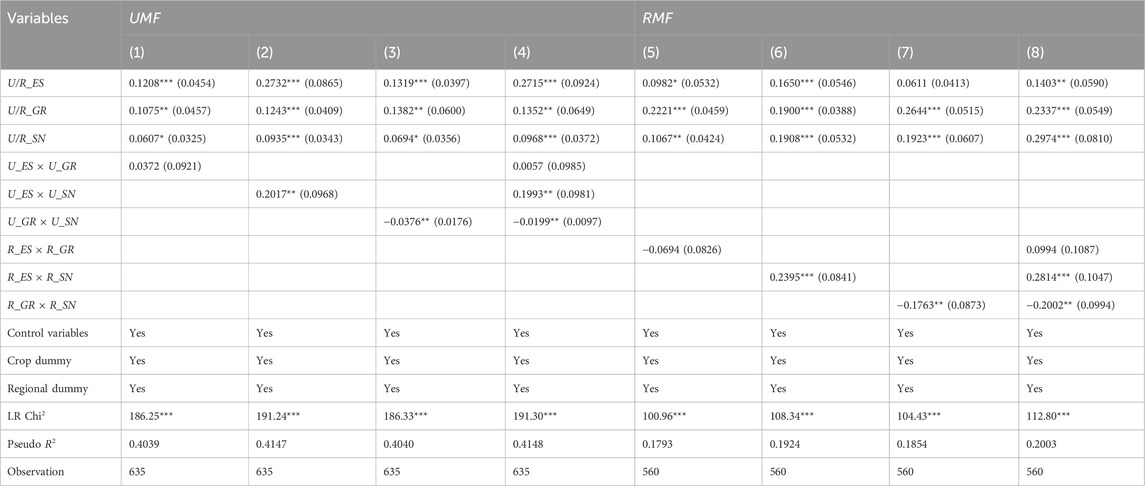
Table 3. The estimated results of interaction effect on plastic mulch adoption and recycling behavior.
In the recycling behavior equation (Columns (5) ∼ (8)), “R_ES × R_SN” is significantly positive at the 1% level, and “R_GR × R_SN” is significantly negative at the 5% level. This implies that economic subsidies and social norms mutually reinforce each other in incentivizing farmers to recycle HSPM and that social norms can serve as an alternative to government regulations. However, the coefficient of “R_ES × R_GR” is negative but fails the significance test, so no significant interaction between economic subsidies and government regulations can be observed. In summary, H4a is not valid, but H4b and H4c are confirmed. In addition, based on column (4) and column (8) of Table 2 and column (4) and column (8) of Table 3, we have plotted marginal effects plots to provide a more intuitive illustration of the estimation results (Figure 6).
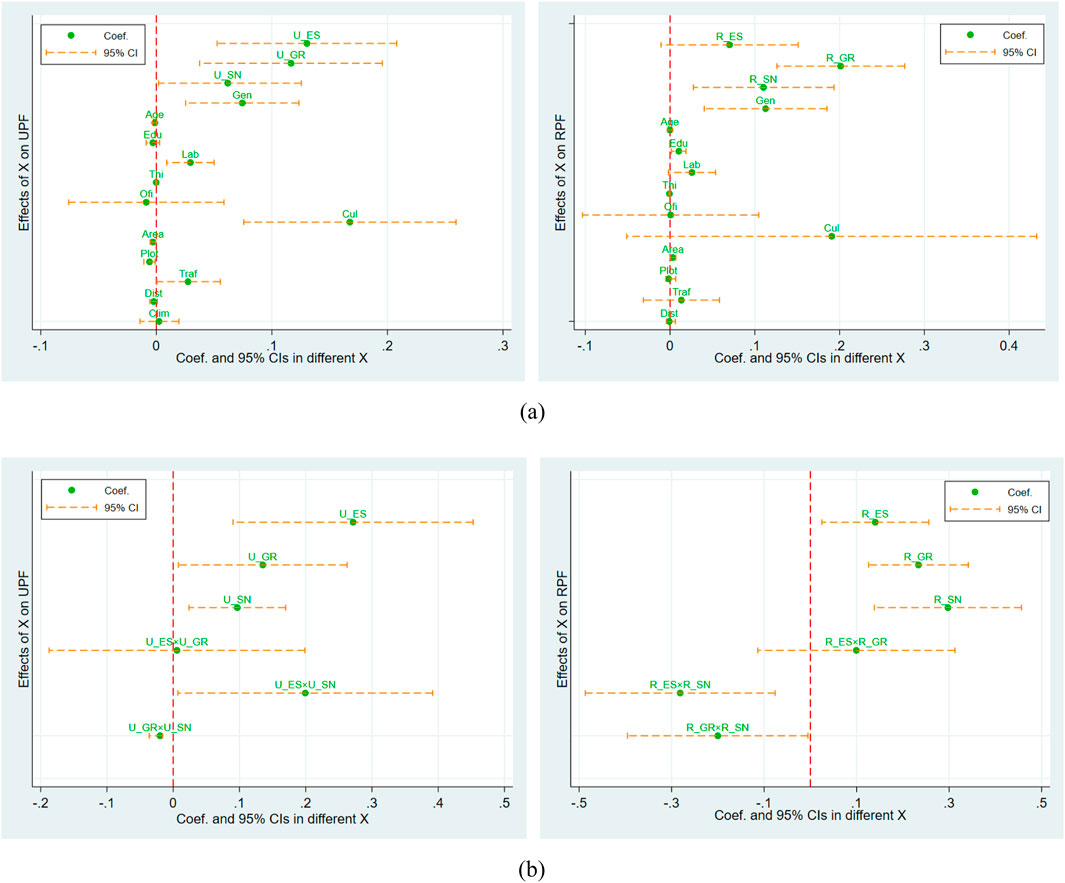
Figure 6. Marginal effects plots. (a) The marginal effect of the independent variable in the baseline results. (b) The marginal effect of the core explanatory variable in the interaction effect results.
4.4 Robustness test and sample selection bias correction
4.4.1 Robustness test
To investigate the robustness of the baseline regression and interaction effect estimation results, strategies such as subsample regression and alternative estimation methods are employed to conduct robustness tests.
Subsample regression: Eliminate the samples of elderly people. While the theoretical analysis framework for farmers’ adoption and recycling of HSPM is deemed accurate and scientific, a possibility of uncertainty remains in the results due to subjective factors associated with the variables (Wang et al., 2020). Owing to physical limitations, elderly people in rural areas are no longer able to engage in labor-intensive agricultural activities. However, HSPM adoption and recycling has primarily been targeted at the rural working-age population, which represents a highly physically demanding aspect of agricultural production. In China, individuals aged over 60 are generally classified as elderly, and aging is currently a severe issue in rural areas. Therefore, we re-estimate Columns (4) and (8) in Tables 2, 3 after removing farmers over 60 years old from our sample. The results presented in Table 4 indicate that following the exclusion of the elderly sample, the marginal effects and significance of each core variable exhibit minimal changes, indicating that this study’s conclusion remains robust.
Alternative regression approach: Logit model. Regression estimates may vary depending on the model settings. In the above article, the Probit model, which is a classical model for analyzing binary dependent variables, was employed for analysis, along with the logit model. The main difference between the two models is that the former assumes that the random variables obey a normal distribution, whereas the latter assumes that the random variables obey a logical distribution. To this end, we use the logit model to reestimate Columns (4) and (8) in Tables 2, 3 to test the robustness of the results in this study. Table 5 shows that after the regression method is replaced, the marginal effects and significance levels of each core independent variable and its interaction terms are basically consistent with the corresponding results estimated via Probit. This indicates that the results in this study are robust and that there is no model specificity.
4.4.2 Sample selection bias correction
According to previous studies (Wang et al., 2020), there may be selection bias in the analysis of plastic mulch recycling behavior because, in the recycling behavior equation, we only analyzed farmers who had already adopted HSPM, but these farmers were not randomly selected. In fact, they are highly aware of environmental protection and are more likely to recycle plastic mulch because of the impact of core independent variables such as economic subsidies. For this reason, the Heckman two-stage selection model is used to test and cope with possible sample selection bias. The Heckman selection model relies on two key assumptions. First, it assumes the presence of a selection mechanism that may cause sample selection bias if uncorrected. This is modeled through a selection equation and an outcome equation. Second, it requires the error terms of the two equations to be jointly normally distributed, allowing the estimation of the correlation between them. To test these assumptions, the Inverse Mills Ratio (IMR) derived from the selection equation is included in the outcome equation. A statistically significant coefficient on the IMR indicates the existence of selection bias and justifies the use of the Heckman model. Conversely, an insignificant coefficient suggests that selection bias may not be a concern, and simpler estimation methods could suffice.
According to the results (Table 6), the IMR passed the significance test in both groups of models without and with interaction variables included, indicating that there is a certain sample selection bias in the results of the baseline regression and interaction effect estimation. Furthermore, the influence direction and significance level of each core independent variable in Columns (1)–(2) and (3)–(4) in Table 6 are highly consistent with the corresponding results in Tables 2-3, respectively. This means that, after the selectivity bias is corrected, the estimated results in this study are still robust.
4.5 Further analysis: effect heterogeneity
To analyze the heterogeneity of the impacts of economic subsidies, government regulations and social norms on farmers’ HSPM adoption and recycling behavior and thus test H5a, H5b, and H5c, the entire sample was divided into four subsamples of small-scale, large-scale, low-income and high-income farmers according to the median of Area and Thi. Additionally, the total sample was divided into two subsamples, yes and no, according to whether they had political identity. A probit model was then employed to perform a regression for each subsample, and the estimated results are shown in Tables 7–9.
4.5.1 Heterogeneity of cultivated land scale
As shown in Table 7, economic subsidies and government regulations clearly have greater impacts on promoting the adoption of HSPM and recycling among large-scale farmers than among small-scale farmers. In contrast, social norms have a greater effect on small-scale farmers than on large-scale farmers. Therefore, H5a is valid. Furthermore, economic subsidies do not have a significant effect on the small-scale farmer group, indicating that their incentive effects on small-scale farmers are almost completely covered by the promoting role of government regulations and social norms. Similarly, the role of social norms in incentivizing HSPM adoption and recycling by large-scale farmers is completely obscured by economic subsidies and government regulations.
4.5.2 Heterogeneity of household income
As shown in Table 8, the incentive effect of economic subsidies on HSPM adoption and recycling is greater for low-income farmers than for high-income farmers. Conversely, government regulations and social norms have a greater promoting effect on high-income farmers than on low-income farmers, therefore validating H5b. We also find that the marginal effects of GR in the low-income group and SN in the high-income group are not significant in the adoption behavior equation. This suggests that incentives for farmers to adopt HSPM, government regulations, and social norms are ineffective for low- and high-income farmers, respectively. Additionally, the recycling behavior of high-income farmers is difficult to stimulate by economic subsidies.
4.5.3 Heterogeneity of political identity
In Table 9, the marginal effect of ES is positive across subsamples, but it only passes the significance test in the group without political identity. The marginal effects of GR and SN pass the significance test and are positive in all subsamples, but their marginal effects are greater in the group with political identity than in the group without political identity. The results show that economic subsidies to encourage HSPM adoption and recycling are effective only for ordinary farmers, whereas government regulations and social norms are more effective for farmers with a political identity, validating Thus, H5c is confirmed. Moreover, the effect of economic subsidies in incentivizing political identity farmers to adopt and recycle HSPM is completely obscured by government regulations and social norms.
The specific relationships among policy tools and farmer types are shown in Figure 7. “No” denotes no effect, “Yes” indicates the presence of an effect, “Poor” signifies minor effect, and “Good” represents substantial effect.
5 Discussion
5.1 The effect of economic subsidies on farmers’ HSPM adoption and recycling behavior
The benchmark results indicate that economic subsidies effectively motivate farmers to adopt and recycle HSPM, which is similar to the findings of previous studies (Li et al., 2021a; Xie et al., 2023). Nevertheless, the impact of economic subsidies on various categories of farmers presents disparities. The main reason for this disparity is that different farmers receive varying amounts of subsidies, and the same amount of subsidies has diverse incentive effects on different farmers. Therefore, establishing a uniform standard related to subsidy amount is challenging (Lutz and Young, 1992; Li et al., 2022).
First, economic subsidies have completely lost their effective incentives for small-scale farmers. Economic subsidies are the greatest source of motivation for farmers’ behavior, but their promotion effect on farmers’ HSPM adoption and recycling has a magnitude effect; that is, they can only have an incentive effect when the subsidy amount surpasses the level of farmers’ anticipated psychological compensation (Gneezy et al., 2011). Clearly, the revenue received from this approach is greater for large-scale farmers than for small-scale farmers whose production needs can be met by a small amount of mulch. When the additional cost of using or recycling HSPM is not covered by the subsidy income, small-scale farmers are discouraged from switching to traditional ultrathin plastic mulch or abandoning recycling. Second, economic subsidies can more effectively incentivize low-income, nonpolitical identity farmers to adopt and recycle HSPM. These two types of farmers have relatively low social status, limited social network resources, and a low possibility of obtaining income from external sources (Cheng et al., 2016), so economic subsidies are more attractive for them to increase their income. In contrast, economic subsidies are insignificant in their attractiveness to farmers with high income and political identity, and their incentive effect is relatively limited.
5.2 The effect of environmental regulations on farmers’ HSPM adoption and recycling behavior
Government regulations can motivate farmers’ HSPM adoption and recycling, and the effect exists in almost all subsamples. This conclusion is consistent with the findings of Xie et al. (2023), who also validated the rationality of the Chinese government’s continuous introduction of relevant environmental regulation policies in recent years. However, it should be noted that the formulation of government regulatory measures should not be one-size-fits-all but should vary from group to group because their effectiveness is heterogeneous in terms of the characteristics of farmers’ operation scale, family income and political identity.
On the one hand, government regulation has a poor incentive effect on small-scale farmers’ HSPM adoption and recycling. Government regulation has the advantages of clear targets and mandatory execution, but considerable manpower and material resources are usually needed to guarantee its effectiveness. However, small farmers are still the most important management body of China’s agriculture, and their number is large and scattered. Compared with large-scale farmers, top-down restrictions on small-scale farmers’ behavior on the basis of enacted laws and regulations have always faced challenges of high costs, inadequate supervision, and low efficiency (Dong et al., 2020), which limits the incentive effect of government regulations. Therefore, the incentive effect of government regulations on small-scale farmers will be much lower than that on large-scale farmers. On the other hand, government regulation has a greater incentive effect on high-income, politically identifiable farmers. Farmers with higher income and political identity tend to have higher social status and prestige in the countryside. They pay more attention to maintaining their own reputation and are also loyal supporters and leading practitioners of laws and regulations. Party members and village officials, in particular, take the lead in using and recycling HSPM to meet the need to build and express an “advanced model” of political identity and thus demonstrate their “courage to take responsibility” image (Xue, 2022). Therefore, the incentive effect of government regulations on HSPM adoption and recycling will be correspondingly greater than that of low-income, nonpolitical identity farmers.
5.3 The effect of social norms on farmers’ HSPM adoption and recycling behavior
In this study, the positive role of social norms in promoting farmers’ HSPM adoption and recycling is confirmed for the first time. This finding confirms the notion that social norms play a positive role in rural ecological environment governance (Xue, 2022). Rural China is a typical relationship network society, and reputation serves as a prerequisite for farmers to derive advantages from this relationship network (such as free help and private lending) (Lan and Liu, 2019). Farmers who fail to adhere to social norms are alienated from other villagers, which increases their chances of profiting from the social network being damaged. Therefore, to prevent farmers from losing the chance to gain advantages from the social network, farmers generally choose to abide by social norms. However, the positive impacts of social norms are not uniform across different groups of farmers.
First, social norms prove to be more efficient in promoting small-scale farmers’ HSPM adoption and recycling. Compared with scale farmers, small-scale farmers tend to be vulnerable members of rural society. Their production and life are more dependent on mutual assistance and cooperation, and they place greater emphasis on personal reputation and collective conventions to maintain the network resources they own (Wu, 2019). Therefore, they are more willing than large-scale farmers are to follow social norms and adopt and recycle HSPM. This also means that under the basic national conditions of small-scale farmers leading agricultural production, guiding and forming rural community autonomy in the adoption and recycling of plastic mulch may be an important approach through which China can address agricultural “white pollution” in the future. Second, among farmers with high income and political identity, the incentive effect of social norms can be enhanced. High-income farmers, who have a higher social status, are at much greater risk of loss if they do not adhere to social norms because their reputation is also at stake (Lemos et al., 2012). Farmers with political status focus on leading by example and adhering to social norms. Only in this way can their social reputation be preserved and village governance be effectively improved. Therefore, even without economic subsidies, reinforcing social norms can serve as a means to encourage farmers with high income and political identity to adopt and recycle HSPM (Jiang, 2019).
5.4 The interactive effect of government subsidies, environmental regulations and social norms
There is a reciprocal relationship between economic subsidies and social norms in promoting HSPM adoption and recycling, consistent with the findings of Li et al. (2022). The complementarity arises because the two measures serve distinct functions (Du and Zhou, 2023). Economic subsidies raise farmers’ marginal returns by increasing transfer income, thereby exerting an incentive effect, while social norms operate through informal institutions that restrict behavior without providing economic rewards (Li et al., 2019). Although functionally different, the two mechanisms complement each other. By contrast, no such complementarity is observed between subsidies and government regulations. In China, social norms appear to be a more effective complement, as external and mandatory regulations are often costly and inefficient, whereas flexible norms enable low-cost, self-governed environmental management through villager autonomy. Once established, these norms become deeply embedded in daily life, widely acknowledged by agricultural workers, and exert a lasting influence on farmers’ adoption and recycling practices (Li C. L. et al., 2021).
In contrast, substitution effects exist between government regulations and social norms, echoing prior studies (Li et al., 2019). The reason lies in their functional overlap: both impose behavioral constraints, but the effect of government sanctions is often overshadowed by the stronger influence of social norms. Under formal regulations, noncompliance entails fines, detention, or other penalties, while under social norms, violators face reputational sanctions such as public criticism and loss of social standing (Li, 2013). In rural China, where communities are close-knit and traditional values such as “face” and “reputation” are highly emphasized, reputational penalties can be more severe than monetary or administrative punishments. As a result, social norms and government regulations perform overlapping functions, with the former predominating, leading to a substitutive rather than complementary relationship.
6 Conclusion
On the basis of survey data from 635 farmers in Gansu Province, China, this study empirically examines the effects of economic subsidies, government regulations and social norms on farmers’ HSPM adoption and recycling behavior. The conclusions of this study are as follows.
This study highlights the effectiveness of economic subsidies, government regulations, and social norms in incentivizing farmers to adopt and recycle high-standard plastic mulch (HSPM). However, the current adoption and recycling rates remain below the state’s target, and the implementation of these measures is relatively limited. To further mitigate agricultural “white pollution,” two critical actions are necessary. First, the central government should expand the pilot programs for HSPM adoption and recycling on a national scale. Second, local governments must enhance the enforcement of supporting measures—such as economic incentives and regulatory policies—while simultaneously fostering the development of social norms in rural communities to promote HSPM adoption and recycling.
Moreover, the interactive effects among these three policy instruments must be carefully considered. Specifically, social norms and economic subsidies exhibit a complementary relationship, whereas social norms and government regulations can act as substitutes. Policymakers should therefore tailor interventions based on local social contexts. In villages where social norms are well established, government regulations can be relaxed to reduce administrative costs. Conversely, in areas lacking such norms, stricter regulatory enforcement is necessary. In the long term, the goal should be to normalize HSPM adoption and recycling by integrating these practices into village-level social norms.
Furthermore, the effectiveness of these incentive measures varies across different farmer groups. Economic subsidies have diminished in their impact on small-scale farmers but remain effective for low-income, nonpolitical farmers. In contrast, government regulations and social norms exert a stronger influence on high-income farmers with political affiliations, with social norms proving more effective than regulations in motivating small-scale farmers. To maximize policy efficiency, a differentiated approach is essential. Strengthening economic subsidies and regulatory oversight can enhance HSPM adoption and recycling among large-scale farmers, while in regions with limited landholding sizes, fostering social norms is crucial. Additionally, local governments should strategically leverage the influence of high-status farmers, encouraging them to serve as role models in promoting the normative adoption and recycling of HSPM within their communities.
Despite providing valuable insights, this study has several limitations that warrant further research. (1) Regional scope and long-term policy impact. This study focuses on farmers in Gansu Province, which may limit the generalizability of its findings to other regions with different socioeconomic and environmental conditions. Future research should expand the geographical scope to validate these results across diverse agricultural contexts. Additionally, the study provides a cross-sectional analysis, lacking insights into the long-term effects of economic subsidies, government regulations, and social norms. Future studies should adopt longitudinal approaches to capture policy effectiveness over time and assess how farmers’ behaviors evolve in response to these interventions. (2) Behavioral mechanisms and micro-level influences. While the study highlights the interactive effects of economic subsidies, government regulations, and social norms, the underlying behavioral mechanisms remain insufficiently explored. Future research should incorporate qualitative methods or experimental approaches to examine how and why these factors shape farmers’ decisions. Additionally, investigating the role of peer influence, risk perception, and technological awareness could provide deeper insights into the micro-level drivers of HSPM adoption and recycling, enabling more targeted and effective policy interventions.
Data availability statement
The raw data supporting the conclusions of this article will be made available by the author, without undue reservation.
Author contributions
XX: Conceptualization, Methodology, Formal Analysis, Writing – original draft. HW: Validation, Methodology, Writing – original draft. SZ: Supervision, Writing – review and editing, Formal Analysis, Methodology. YL: Software, Data curation, Writing – review and editing.
Funding
The author(s) declare that financial support was received for the research and/or publication of this article. Hunan Provincial Natural Science Foundation Youth Program (2022JJ40191).
Conflict of interest
The authors declare that the research was conducted in the absence of any commercial or financial relationships that could be construed as a potential conflict of interest.
Generative AI statement
The author(s) declare that no Generative AI was used in the creation of this manuscript.
Any alternative text (alt text) provided alongside figures in this article has been generated by Frontiers with the support of artificial intelligence and reasonable efforts have been made to ensure accuracy, including review by the authors wherever possible. If you identify any issues, please contact us.
Publisher’s note
All claims expressed in this article are solely those of the authors and do not necessarily represent those of their affiliated organizations, or those of the publisher, the editors and the reviewers. Any product that may be evaluated in this article, or claim that may be made by its manufacturer, is not guaranteed or endorsed by the publisher.
References
Cheng, M. W., Shi, Q. H., Jin, Y. H., and Gai, Q. E. (2016). Marketization, political identity and the income effect: evidence from China’s farmers. Manag. World (3), 46–59. doi:10.19744/j.cnki.11-1235/f.2016.03.005 (in Chinese)
Cheng, W. L., Wang, L., Wang, S. Y., Ma, M. S., and Dang, Y. (2018). Effects of different biodegradable films on soil quality. Gansu Agric. Sci. Technol. 5, 27–31. (in Chinese)
Cialdini, R. B., and Goldstein, N. J. (2004). Social influence: compliance and conformity. Annu. Rev. Psychol. 55 (1), 591–621. doi:10.1146/annurev.psych.55.090902.142015
Daryanto, S., Wang, L. X., and Jacinthe, P. A. (2017). Can ridge-furrow plastic mulching replace irrigation in dryland wheat and maize cropping systems? Agric. Water Manag. 190, 1–5. doi:10.1016/j.agwat.2017.05.005
De Lucia, C., and Pazienza, P. (2019). Market-based tools for a plastic waste reduction policy in agriculture: a case study in the south of Italy. J. Environ. Manag. 250, 109468. doi:10.1016/j.jenvman.2019.109468
Dong, L. M., and Guo, J. X. (2017). Face view and rural governance in rural society. Soc. Sci. China 8, 147–160. (in Chinese)
Dong, L., Yu, Y. L., Li, H., and Li, L. (2020). Multiple government regulation, market returns and reduced application of fruit crops. Ecol. Econ. 36 (11), 106–110. (in Chinese)
Du, H. M., and Zhou, J. (2023). Formal system, informal system and manure resource utilization behavior of farmers: a composite study based on NCA and QCA. J. Huazhong Agric. Univ. Soc. Sci. Ed. 3, 103–114. (in Chinese). doi:10.13300/j.cnki.hnwkxb.2023.03.010
Feng, X., Qiu, H., Liu, M., and Tang, J. (2024). Innovation of grassland ecological governance systems: synergy between government regulation and grassroots governance. Ecol. Econ. 217, 108087. doi:10.1016/j.ecolecon.2023.108087
Gansu Provincial Bureau of Statistics (2019). Gansu statistical Yearbook 2019. Gansu: China Statistics Press. (in Chinese)
Gao, H., Yan, C., Liu, Q., Ding, W., Chen, B., and Li, Z. (2019). Effects of plastic mulching and plastic residue on agricultural production: a meta-analysis. Sci. Total Environ. 651, 484–492. doi:10.1016/j.scitotenv.2018.09.105
Gneezy, U., Meier, S., and Rey-Biel, P. (2011). When and why incentives (don’t) work to modify behavior. J. Econ. Perspect. 25 (4), 191–210. doi:10.1257/jep.25.4.191
Gunningham, N. (2011). Enforcing environmental regulation. J. Environ. Law 23 (2), 169–201. doi:10.1093/jel/eqr006
Guo, Q. H., Li, H., Li, S. P., and Liu, L. (2019). Impact of individual norms on farmers’ pro-environment behavior: a theoretical framework based on extended norms activation. Resour. Environ. Yangtze Basin 28 (5), 1176–1184. doi:10.11870/cjlyzyyhj201905017 (in Chinese)
Guo, Q. H., Li, S. P., and Li, H. (2020). Social norms, individual norms and farmers’ organic fertilizer application behavior: moderating effects based on organic fertilizer cognition. J. Arid Land Resour. Environ. 1, 19–26. (in Chinese). doi:10.13448/j.cnki.jalre.2020.003
Hou, L. Q., Zhang, J., and Zhai, X. L. (2019). Social norms, ecological cognition and farmers’ behavior of plastic film recycling. J. Arid Land Res. Environ. 33, 54–59. doi:10.13448/j.cnki.jalre.2019.346
Hu, Y., Liu, D. L., Wang, L., and Wan, X. C. (2019). The use and recycling experience of agricultural plastic film in developed countries. World Agriculture 2, 89–94. doi:10.13856/j.cn11-1097/s.2019.02.015 (in Chinese)
Huber, R. A., Anderson, B., and Bernauer, T. (2018). Can social norm interventions promote voluntary pro-environmental action? Environ. Sci. and Policy 89, 231–246. doi:10.1016/j.envsci.2018.07.016
Jiang, P. (2019). Discipline and punishment: social logic analysis of classified treatment of rural domestic waste in Zhejiang Province. J. Huazhong Agric. Univ. Soc. Sci. Ed. 3, 103–110. doi:10.13300/j.cnki.hnwkxb.2019.03.013 (in Chinese)
Jin, T., Xue, Y. H., Zhang, M. M., Zhou, T., and Liu, H. J. (2020). Domestic and foreign agricultural mulch use policies, standards and recycling situation. J. Ecol. Environ. 29 (2), 411–420. doi:10.16258/j.cnki.1674-5906.2020.02.024 (in Chinese)
Kerridge, K. W. (1978). Value orientations and farmer behaviour: an exploratory study. Q. Rev. Rural Econ. 31 (1), 61–72.
Koskei, K., Munyasya, A. N., Wang, Y., Zhao, Z. Y., Zhou, R., Indoshi, S. N., et al. (2021). Effects of increased plastic film residues on soil properties and crop productivity in agro-ecosystem. J. Hazard. Mater. 414, 125521. doi:10.1016/j.jhazmat.2021.125521
Lan, J., and Liu, Z. (2019). Social network effect on income structure of SLCP participants: evidence from Baitoutan Village, China. For. Policy Econ. 106, 101958. doi:10.1016/j.forpol.2019.101958
Lemos, M. C., Kirchhoff, C. J., and Ramprasad, V. (2012). Narrowing the climate information usability gap. Nat. Clim. Change 2, 789–794. doi:10.1038/nclimate1614
Li, C. J. (2013). Analysis on the operation mechanism of informal system in the background of acquaintance society. Yunnan Soc. Sci. 6, 152–155. (in Chinese). doi:10.3969/j.issn.1000-8691.2013.06.031
Li, R. Z. (2022). Research on utilization and problems of waste agricultural film resources in Chongqing under the background of agricultural green development. Mod. Agric. 2, 92–95. (in Chinese). doi:10.14070/j.cnki.15-1098.2022.02.011
Li, M., and Yao, S. B. (2020). Village-level governance impact on farmers’ income mechanism analysis. Agric. Technol. Econ. 9, 20–31. (in Chinese). doi:10.13246/j.cnki.jae.2020.09.002
Li, F. N., Zhang, J. B., and He, K. (2019). Alternative and complementary: farmers to produce green of the unofficial system and formal system. J. Huazhong Univ. Sci. Technol. Soc. Sci. Ed. 33 (6), 51–60. (in Chinese). doi:10.19648/j.cnki.jhustss1980.2019.06.07
Li, C., Guo, J., Xu, X., Sun, M., and Zhang, L. (2021a). Determinants of smallholder farmers’ choice on mulch film thickness in rural China. Environ. Sci. Pollut. Res. 28, 45545–45556. doi:10.1007/s11356-021-13866-x
Li, C. L., Zhang, Q., and Zhou, H. (2021b). Social norms, economic incentives and farmers’ recycling behavior of pesticide packaging waste. J. Nanjing Agric. Univ. 21 (1), 133–142. (in Chinese). doi:10.19714/j.cnki.1671-7465.2021.0013
Li, C., Sun, M., Xu, X., Zhang, L., Guo, J., and Ye, Y. (2021c). Environmental village regulations matter: mulch film recycling in rural China. J. Clean. Prod. 299, 126796. doi:10.1016/j.jclepro.2021.126796
Li, B., Xu, C., Zhu, Z., and Kong, F. (2022). How to encourage farmers to recycle pesticide packaging wastes: subsidies VS social norms. J. Clean. Prod. 367, 133016. doi:10.1016/j.jclepro.2022.133016
Li, C. Q., Zhao, M., and Shi, Y. (2023). Farmers’ preferences for diversifying compensation policy for mulch film pollution control: a discrete choice experiment in Northwest China. J. Clean. Prod. 416, 137962. doi:10.1016/j.jclepro.2023.137962
Liang, R. Q., Chen, X. G., Zhang, B. C., Meng, H. W., and Jiang, P. (2019). Current problems and countermeasures of recycling methods and recycling of residual film in cotton fields in Xinjiang. Trans. Chin. Soc. Agric. Eng. 35 (16), 1–13. (in Chinese)
Liu, E. K., He, W. Q., and Yan, C. R. (2014). White revolution’ to ‘white pollution’—Agricultural plastic film mulch in China. Environ. Res. Lett. 9, 091001. doi:10.1088/1748-9326/9/9/091001
Liu, Y., Zhou, M. L., Zhai, X. L., and Wei, S. (2020). Farmers’ willingness to be compensated for the recovery action and its influencing factors. J. Arid Land Resour. Environ. 34, 31–38. doi:10.13448/j.cnki.jalre.2020.236
Liu, M. Y., Zheng, X., Qiang, L. Y., Li, L. H., and Zhang, R. Y. (2023). Changes in the use of agricultural film and the pollution status of agricultural film microplastics in China from 1994 to 2020. J. Ecol. Environ. 32 (11), 2050–2061. doi:10.16258/j.cnki.1674-5906.2023.11.015 (in Chinese)
Lu, Y. P., Wang, J. P., and Wang, P. C. (2016). The happiness effect of identity: empirical evidence from Party members. Econ. Trends 9, 29–40.
Luo, L., Liu, Y. C., Li, H., Yang, X. F., and Ma, M. Y. (2021). How do informal and formal institutions promote green production? J. Arid Land Resour. Environ. 35 (6), 8–14. doi:10.13448/j.cnki.jalre.2021.151 (in Chinese)
Lutz, E., and Young, M. (1992). Integration of environmental concerns into agricultural policies of industrial and developing countries. World Dev. 20 (2), 241–253. doi:10.1016/0305-750X(92)90102-2
Ostrom, E. (2014). Collective action and the evolution of social norms. J. Nat. Resour. Policy Res. 6 (4), 235–252. doi:10.1080/19390459.2014.935173
Pang, J., and Jin, S. Q. (2023). Exploration and innovation of agricultural film recycling mechanism based on extension of producer responsibility: a case study of pilot project in Kairu County, Inner Mongolia. World Environ. 5, 42–44. (in Chinese).
Pejovich, S. (1999). The effects of the interaction of formal and informal institutions on social stability and economic development. J. Mark. and Moral. 2 (2), 164–181.
Reno, R. R., Cialdini, R. B., and Kallgren, C. A. (1993). The transsituational influence of social norms. J. Personality Soc. Psychol. 64 (1), 104–112. doi:10.1037/0022-3514.64.1.104
Shi, X., Niu, C. H., Qiao, Y. Y., Zhang, H. C., and Wang, X. N. (2016). Research progress of plastic waste separation technology in waste mulch and impurity separation. Trans. Chin. Soc. Agric. Eng. 32 (S2), 22–31. doi:10.11975/j.issn.1002-6819.2016.z2.004 (in Chinese)
Song, D., Sun, H., Yang, Y., Wang, X., Sun, Y., Liu, X., et al. (2021). Status of phthalate esters in tobacco cultivation soils and its health risk to Chinese people. J. Soils Sediments 21, 307–318. doi:10.1007/s11368-020-02773-2
Sun, Q. L., Fang, K. X., and Liu, T. P. (2020). Impact of social norms and public supervision on the willingness and behavior of farming households to participate in rural living environment improvement: empirical analysis based on generalized continuous ratio model. Resour. Sci. 42 (12), 2354–2369. (in Chinese). doi:10.18402/resci.2020.12.08
Tan, M., Yan, X., and Feng, W. (2019). The mechanism and empirical study of village rules in rural revitalization and ecological governance. Rev. Cercet. şi Interv. Socială 64, 276–299. doi:10.33788/rcis.64.22
Wang, T. X., and Yang, H. H. (2021). An empirical study on the relationship between social norms, ecological cognition and farmers’ willingness to recycle plastic film: taking environmental regulation as the moderating variable. J. Arid Land Resour. Environ. 35 (3), 14–20. (in Chinese). doi:10.13448/j.cnki.jalre.2021.064
Wang, L., Zhang, B., and Tian, G. (2018). Research on government intervention in agricultural plastic film using and recycling. Issues Agric. Econ. 8, 144. (in Chinese). doi:10.13246/j.cnki.iae.2018.08.014
Wang, Y., He, K., Zhang, J., and Chang, H. (2020). Environmental knowledge, risk attitude, and households’ willingness to accept compensation for the application of degradable agricultural mulch film: evidence from rural China. Sci. Total Environ. 744, 140616. doi:10.1016/j.scitotenv.2020.140616
Wu, Y. M. (2019). In the process of the urbanization of small farmers differentiation and upgrade. J. Soc. Sci. 9, 74–84. (in Chinese). doi:10.13644/j.cnki.cn31-1112.2019.09.008
Wu, C. C., Ma, Y. J., Wang, D., Shan, Y., Song, X., Hu, H., et al. (2022). Integrated microbiology and metabolomics analysis reveal plastic mulch film residue affects soil microorganisms and their metabolic functions. J. Hazard. Mater. 423, 127258. doi:10.1016/j.jhazmat.2021.127258
Xie, X. X., Xu, H., Zhang, W. E., and Zhao, M. (2023). What government interventions are effective in regulating the use and recycling of high-standard mulch film in China? Environ. Sci. Pollut. Res. 30 (52), 112144–112158. doi:10.1007/s11356-023-30121-7
Xue, C. X. (2022). Farmers political identity leads the effect of green agricultural production technology. J. Northwest A&F Univ. Sci. Technol. Soc. Sci. Ed. 22 (3), 148–160. (in Chinese). doi:10.13968/j.cnki.1009-9107.2022.03.18
Xue, Y., Guo, J., Li, C., Xu, X., Sun, Z., Xu, Z., et al. (2021). Influencing factors of farmers’ cognition on agricultural mulch film pollution in rural China. Sci. Total Environ. 787, 147702. doi:10.1016/j.scitotenv.2021.147702
Yang, C., Liang, X., Xue, Y., and Zhang, Y. y. (2024). Can government regulation weaken the gap between green production intention and behavior? Based on the perspective of farmers’ perceptions. J. Clean. Prod. 434, 139743. doi:10.1016/j.jclepro.2023.139743
Zhang, L. H. (2020). Thinking on recycling and processing of waste agricultural film in Gansu Province. Extending Agric. Mach. Sci. Technol. 1, 15–17. (in Chinese)
Zhang, X., and Quan, S. M. (2022). Research on recycling status of waste agricultural film based on China’s policies. China Plast. 4 (7), 136–142. (in Chinese). doi:10.19491/j.issn.1001-9278.2022.07.019
Zhang, D., Wang, H. Y., Hu, W. L., Yang, H. D., and Xu, Y. (2017). Effects of film thickness on crop yield and soil environment. J. Agro-Environmental Sci. 36 (2), 293–301. doi:10.11654/jaes.2016-1008 (in Chinese)
Zhang, B., Wang, Z., and Jin, S. Q. (2019). Current situation and prospect of agricultural film pollution control in China. World Environ. 6, 22–25.
Zhang, D., Ng, E. L., Hu, W. L., Wang, H., Galaviz, P., Yang, H., et al. (2020). Plastic pollution in croplands threatens long-term food security. Glob. Change Biol. 26 (6), 3356–3367. doi:10.1111/gcb.15043
Zhao, Z. Y., Wang, P. Y., Wang, Y. B., Zhou, R., Koskei, K., Munyasya, A. N., et al. (2021). Fate of plastic film residues in agro ecosystem and its effects on aggregate-associated soil carbon and nitrogen stocks. J. Hazard. Mater. 416, 125954. doi:10.1016/j.jhazmat.2021.125954
Zhao, J. J., Tang, J. R., Li, C. X., He, H. Q., and Huang, H. (2024). Distribution characteristics and influencing factors of soil mulch residue in farmland layer in Gansu Province. Chin. J. Eco-Agriculture 32 (3), 456–467. doi:10.12357/cjea.20230563 (in Chinese)
Zheng, Z. F., Zhu, R. Y., Lu, Y., Long, W., and Chen, X. (2020). An empirical study on the influence factors of farmers’ plastic film recycling choice: based on the survey data of 9 typical agricultural counties in Yunnan Province. J. Ecol. Rural Environ. 36 (7), 890–896. doi:10.19741/j.issn.1673-4831.2019.0776 (in Chinese)
Keywords: environmental regulation, social norms, HSPM adoption and recycling behavior, plastic mulch pollution control, China
Citation: Xie X, Wang H, Zhang S and Liu Y (2025) How to incentivize farmers to adopt and recycle high-standard plastic mulch in China: economic subsidies, government regulations or social norms?. Front. Environ. Sci. 13:1683437. doi: 10.3389/fenvs.2025.1683437
Received: 11 August 2025; Accepted: 06 October 2025;
Published: 21 October 2025.
Edited by:
Huantian Cao, University of Delaware, United StatesReviewed by:
Ramiya Baskaran, Corteva Agriscience, United StatesYue Deng, Xi’an University of Science and Technology, China
Copyright © 2025 Xie, Wang, Zhang and Liu. This is an open-access article distributed under the terms of the Creative Commons Attribution License (CC BY). The use, distribution or reproduction in other forums is permitted, provided the original author(s) and the copyright owner(s) are credited and that the original publication in this journal is cited, in accordance with accepted academic practice. No use, distribution or reproduction is permitted which does not comply with these terms.
*Correspondence: Siyang Zhang, c2l5YW5nemhhbmdAcnVjLmVkdS5jbg==
 Xianxiong Xie1
Xianxiong Xie1 Siyang Zhang
Siyang Zhang